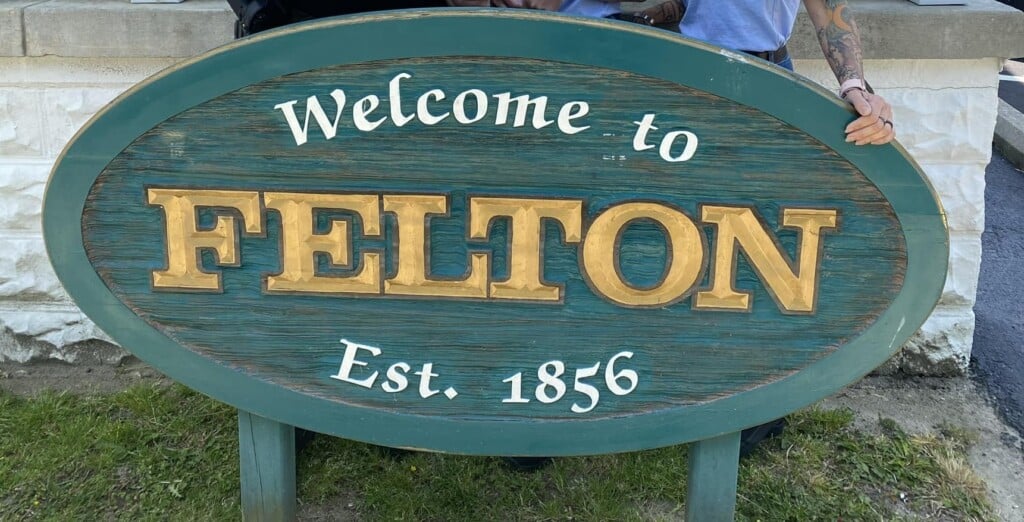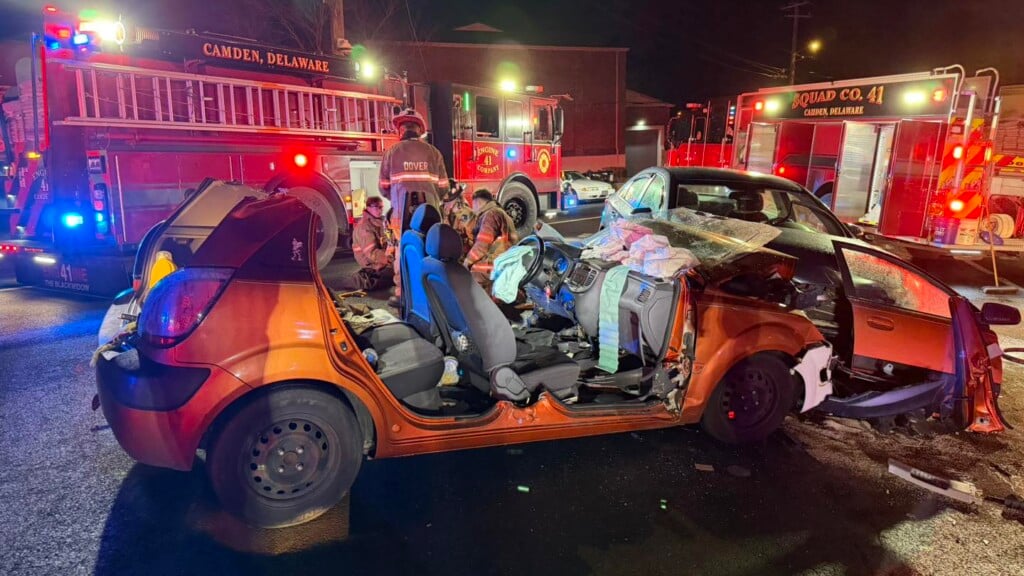Local entrepreneur, mom shares story of surviving LGBTQ+ domestic violence
LONG NECK, Del. – Domestic violence is a really tough topic to talk about. And because of that, it can often go unreported. Especially in the LGBTQ+ community, survivors of domestic violence say there’s a stigma of silence around abuse between intimate partners.
A Sussex County business owner, and mom of three, is now sharing her story of surviving domestic violence. Patty Rickman hopes that by speaking out, others might share their own experiences.
Meet Patty Rickman
When you ask Patty Rickman who she is, her face will immediately light up as she tells you that first, and foremost, she’s a mom of three daughters. As she describes her daughters, who she shares with her ex-wife turned best friend, it’s obvious that Patty loves her children more than anyone – or anything – else.
Next, she’ll put on her business owner hat. Patty owns Serendipitous in Long Neck, a spiritual one-stop-shop. Starting up, and running the business, Patty says, wouldn’t have been possible without the support of her tight-knit community of friends.
Aside from being a mom, and a business owner, Patty says, she’s a constant nomad on the journey of bringing light to the darkest places.
“I am a person in search of the truth. And, I’m authentic. I feel like one of my many jobs in this incarnation is to shine light on injustices,” said Patty as she sat down with 47 ABC WMDT on Thursday.
Finding A Way Out
Patty is also a survivor of domestic abuse.
Throughout a four-year on-and-off relationship, Patty says she was subjected to psychological, verbal, physical, and sexual abuse, at the hands of her then-partner, who is also a woman. 47 ABC WMDT is not publicly identifying Patty’s abuser, at Patty’s request.
“There were times that my offender tried to kill me. Specifically, at a hotel in Maryland, I was held against my will. I was suffocated and choked out, and I was not allowed to leave the hotel room,” said Patty. “[My daughters and I have] been run off the road with an automobile that was used as a weapon more than one time. And, we were held against our will coming back from Hershey Park. We were weaving in and out of traffic at speeds of about 80 miles per hour.”
Patty says she did everything she could have done to try and get her abuser help; addiction treatment, therapy, and anger management. Nothing worked, says Patty, and she finally came to the realization that she had to get out of the relationship; not only to protect herself, but to protect her family and friends.
“There has still been so much slander, and defamation of character, and passive aggressive threats that I have gotten over the last few months. Threats like, ‘I’m going to destroy you.’ That, I’m going to be set up and sent to prison,” said Patty. “I’m still finding social media posts that were made by my offender in an effort to completely destroy me, and the people that are near me.”
Harassment Continues
Patty’s abuser has been convicted of stalking, violating a protective order, harassment, and even terroristic threatening. Patty says her offender called in a bomb threat at a local bank, and later publicly spread allegations that Patty had made the call.
“That has affected my life, and my business, because that went on social media platforms to everyone. There were even social media posts on my business, and a regurgitation of lies,” said Patty.
Even after Patty made moves to separate herself from her abuser, the harassment continued. Last year, Patty, one of her daughters, and a group of friends were planning for a getaway 50th birthday cruise. The night before the cruise was scheduled to set sail, Patty got a phone call from the cruise line.
“They told me that someone called, pretending to be me, which the police reported that it was my offender, and stated that I had COVID, as well as my youngest daughter had COVID. So, my cruise was cancelled,” said Patty.
A cancelled cruise pales in comparison to the real fear that Patty endured following her abuser’s conviction and sentencing, she says. The threats continued, and spread, says Patty. Adding, her friends claim Patty’s abuser tried to run them off the road, too.
“It was scary because, the whole time, there were threats, not just to myself, but to other friends and family. Threats like my offender was going to destroy their businesses, and report them for crimes that they didn’t commit,” said Patty. “There are some roads that I can’t even drive down because those things happened. It’s really difficult for me to process without the emotional triggers.”
All of these experiences, culminating in a PTSD diagnosis for Patty. “Navigating through [PTSD] has caused a lot of triggers, and fear, and trauma. Being stalked is one of the scariest things that’s ever happened to me,” she said.
The Silence of Stigma
It’s a terrifying situation to be in, and Patty says reporting domestic abuse can be even scarier, especially within the LGBTQ+ community. Patty feels that in LGBTQ+ domestic violence situations, because there is not always a man versus woman dynamic, people may not identify it as abuse.
“I’ve kept silent in an effort to think that one day maybe it would get better. But, it has not. In fact, in some ways it’s gotten worse. And, I just want to shine a light and stand up to domestic violence,” said Patty.
“48.6% of lesbians report domestic violence,” said Patty. “And, out of that percentage, less than 5% actually report it. And, out of that small percentage, less than 1.5% actually follow through, and either get a protective order, which I had to do, or they have to move forward and do other things to protect themselves.”
Patty says she, too, is battling silence. “When you look at my offender, you would not think, automatically, that this would be an abusive situation. I was threatened many times by my offender that no one would believe me,” she said. “In the LGBTQ community, we don’t talk about it. It’s not something that we talk about. And, we need to, because it exists.”
The Delaware Coalition Against Domestic Violence says the issue is even further reaching than that. About 25% of American women, and about 14% of American men have experienced severe physical violence from an intimate partner. In a 24 hour survey, the National Network to End domestic Violence found that crisis hotlines field as many as 20,000 calls in one day alone.
The coalition says victims might not report abuse out of fear of being outed, facing further abuse, or simply not being believed.
Speaking Out, Standing Up
It’s that silence that Patty says is giving her the strength and courage to share her own story.
“I had people reach out to me and say, ‘Patty, I’ve had the same experience as you, I want to come forward, but I’m scared, I don’t know where to turn,'” said Patty. “So, that has created an opportunity for me to try to reach out to local politicians, try to reach out to local organizations that deal with domestic violence.”
Patty says she had an “amazing” experience with law enforcement throughout all that she endured. However, she wants to see regular people, and other victims, search for the truth of domestic violence, too.
“Delaware State Police – I’m going to get emotional – because I feel I may not be here if it wasn’t for them, and if it wasn’t for their professionalism, and if it wasn’t for them looking at the evidence and the facts,” said Patty. “We, as citizens, have the right to speak up against injustice. We have a right to stand up against domestic violence.”
Beyond that, Patty has this message for other survivors, or current victims, of domestic violence:
“When somebody says ‘No means no,’ that is a full stop,” said Patty. “This is not an easy subject to talk about. I know, for me, it’s not easy to talk about. But, it’s necessary. I truly believe the only way out is through.”
Get Involved, Domestic Violence Resources
On Friday, April 21st, Patty plans to host a rally in Georgetown to bring more awareness not only to her story; but to the stories that haven’t been told yet. She also plans to advocate for more equitable handling of domestic violence cases that go to court.
Below, are resources for victims of domestic violence, and their family members, in Delaware:
Delaware Coalition Against Domestic Violence:
- 24-hour domestic violence hotlines (New Castle County 302-762-6110, Kent and Sussex Counties 302-422-8058, Spanish language 302-745-9874)
- Domestic violence shelter listing
- Support in court
- Counseling and support
- Police-based victim assistance
- Offender treatment
- Links to government agencies, COVID-19 resources
- Health and wellbeing
- DV-Community Health Worker project (Referral number 302-757-2137)
- SAFE (24-hour domestic violence hotline 302-422-8058, domestic violence shelters in Kent and Sussex Counties, domestic violence liasons)
- Abriendo Puertas (Emergency shelter program for Latina women and children in domestic violence situations in Sussex County)
- Center for Community Justice
- Counseling centers
- Family visitation centers
- Group home for girls
- Independent living
- Turning Point (Offers a broad range of prevention and intervention services throughout Kent and Sussex Counties for domestic violence offenders, victims, and children affected by domestic violence)
- Veterans Outreach
- Whatcoat Social Services
VINE: Delaware Victim Information Network
- Obtain timely and reliable information regarding the custody status of offenders 24 hours a day
- Call with any questions or concerns in reference to an offender (Delaware Department of Correction Victims Unit at 302-857-5440)
One Love Danger Assessment App
- Free and anonymous smartphone app that helps determine if you are in a healthy relationship
Delaware Technical Community College
- Owens Campus Empowerment Scholarship is available to victims of domestic violence enrolled at the Jack F. Owens Campus in Georgetown
- Contact Owens Campus Financial Aid Office to determine eligibility (302-855-1693)
Help Hotlines and Websites
- Dover Behavioral Health (302-741-0140)
- Rape Crisis (Kent and Sussex Counties 1-800-262-9800)
- Child Priority Response (If you are under18 years old and feel that you may harm yourself or someone else, call CPR at 302-424-HELP, or call 911)
- Hopeline (1-800-SUICIDE)
- Mobile Crisis (If you are over the age of 18 and feel that you may harm yourself or someone else, call the MCU at 1-800-345-6785 or call 911)
- Suicide Prevention Lifeline (1-800-273-TALK)
- Delaware Children’s Department
- Poison Control Center
- National Alliance for Mentally Ill in Delaware
- Mental Health Association


